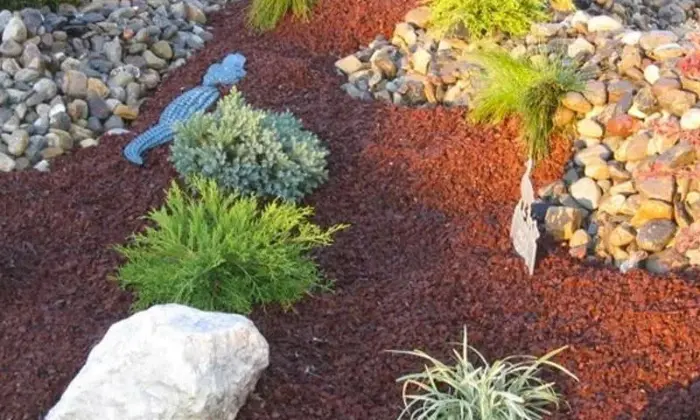Welcome to I Haul Landscape Services! Are you curious about the durability of rubber mulch? In this guide, we’ll explore the main question: how long does rubber mulch last? As your trusted landscaping partner, we’re here to provide insights into the longevity of rubber mulch and its benefits. Whether you’re considering rubber mulch for your garden or commercial landscaping project, understanding its lifespan is crucial. Join us as we delve into the world of rubber mulch and discover why it’s a popular choice for sustainable and long-lasting landscaping solutions.
How Long Does Rubber Mulch Last?
Rubber mulch is renowned for its longevity compared to traditional wood mulch. Made from recycled tires, rubber mulch can last for up to 10 years or more with proper maintenance. Unlike wood mulch, which decomposes over time, rubber mulch retains its form and color, providing a long-lasting solution for landscaping needs. Its ability to withstand harsh weather conditions, including intense sunlight, heavy rain, and freezing temperatures, contributes to its extended lifespan.
How Long Does Rubber Mulch Color Last?
One of the key advantages of rubber mulch is its ability to maintain color for an extended period. Unlike wood mulch, which fades and decomposes over time, rubber mulch retains its vibrant color for years. However, prolonged exposure to sunlight and harsh weather conditions can cause some fading over time. To prolong the color life of rubber mulch, applying a UV-resistant coating can be beneficial. Additionally, periodic fluffing or turning of the mulch can help redistribute the color and maintain its appearance.
Pros and Cons of Rubber Mulch
Pros:
Durability:
Rubber mulch is highly durable and can last for many years without needing replacement.
Low Maintenance:
Unlike wood mulch, rubber mulch requires minimal maintenance, such as occasional fluffing and debris removal.
Weed Control:
Rubber mulch acts as a barrier against weeds, reducing the need for weed removal and herbicides.
Safety:
Its shock-absorbing properties make rubber mulch a popular choice for playgrounds, providing a softer landing surface than traditional mulches.
Environmentally Friendly:
By recycling tires, rubber mulch helps reduce waste and promotes sustainability.
Cons:
Initial Cost:
Rubber mulch can be more expensive upfront compared to wood mulch.
Heat Retention:
On hot days, rubber mulch can retain heat, potentially affecting plant growth.
Odor:
Some rubber mulch products may emit a slight odor, especially when first installed.
Non-Biodegradable:
Unlike wood mulch, rubber mulch does not decompose, posing challenges for disposal and recycling.
Potential Health Risks:
There are concerns about the chemicals leaching from rubber mulch, although studies have shown minimal risk.
Rubber Mulch vs. Wood Mulch
While both rubber mulch and wood mulch serve the purpose of enhancing landscaping aesthetics and promoting plant health, they differ in several key aspects.
Appearance:
Rubber Mulch:
Offers a consistent appearance and color retention over time.
Wood Mulch:
Natural appearance but tends to fade and decompose over time.
Longevity:
Rubber Mulch:
Lasts up to 10 years or more with minimal maintenance.
Wood Mulch:
Decomposes over time and requires replenishment every 1-2 years.
Environmental Impact:
Rubber Mulch:
Made from recycled tires, promoting sustainability.
Wood Mulch:
Biodegradable but requires the cutting of trees for production.
Is Rubber Mulch Good?
Overall, rubber mulch can be a good choice for landscaping projects, especially in areas where durability and low maintenance are priorities. Its long lifespan, color retention, and weed control properties make it a popular option for both residential and commercial applications. However, it’s essential to weigh the pros and cons and consider factors such as cost, environmental impact, and personal preferences before making a decision.
Common Rubber Mulch Problems
Compaction:
Over time, rubber mulch may become compacted, reducing its effectiveness in providing aeration to plant roots.
Displacement:
Heavy rainfall or strong winds can cause rubber mulch to shift or wash away, requiring periodic maintenance.
Insect Attraction:
While rubber mulch doesn’t attract insects like wood mulch does, it can still provide shelter for pests such as rodents if not properly maintained.
Chemical Leaching:
There have been concerns about the leaching of chemicals from rubber mulch, although studies suggest minimal risk to human health.
Conclusion
In conclusion, rubber mulch offers a durable and long-lasting alternative to traditional wood mulch. With its ability to maintain color and withstand harsh weather conditions, it’s an attractive option for landscaping projects. While it may have some drawbacks, such as initial cost and potential environmental concerns, the benefits often outweigh the drawbacks for many homeowners and landscapers. By understanding how long rubber mulch lasts and considering its pros and cons, you can make an informed decision for your landscaping needs.
FAQs
How Long Does Rubber Mulch Last Compared To Wood Mulch?
Rubber mulch typically lasts much longer than wood mulch, with a lifespan of up to 10 years or more. In contrast, wood mulch decomposes over time and usually needs to be replenished every 1-2 years.
Will Rubber Mulch Fade Over Time?
While rubber mulch is known for retaining its color better than wood mulch, prolonged exposure to sunlight and harsh weather conditions can cause some fading. Applying a UV-resistant coating can help prolong the color life of rubber mulch.
Is Rubber Mulch Safe For Use Around Plants And Pets?
Generally, rubber mulch is considered safe for use around plants and pets. However, it’s essential to choose a high-quality product that has been tested for safety. Avoid using rubber mulch made from tires that may contain harmful chemicals.
How Do I Maintain Rubber Mulch?
Maintaining rubber mulch is relatively easy. Periodically fluffing or turning the mulch can help redistribute the color and prevent compaction. Remove any debris or weeds that may accumulate on the surface. Additionally, applying a fresh layer of mulch every few years can help maintain its appearance and effectiveness.
Can Rubber Mulch Attract Insects Or Pests?
Rubber mulch does not attract insects in the same way that wood mulch does. However, it can provide shelter for pests such as rodents if not properly maintained. Regularly inspecting and cleaning the area around the mulch can help prevent pest infestations.

